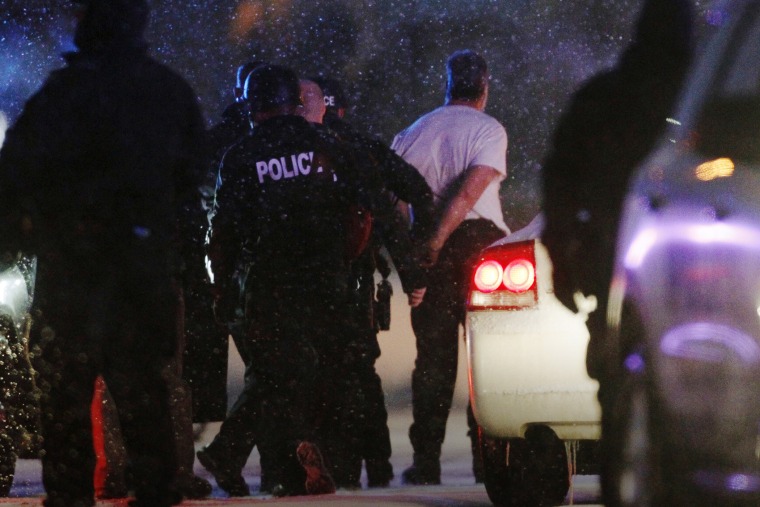Americans were confronted last week with two competing stories, which, when combined, painted a rather disjointed picture. The first story was the Republican campaign to block Syrian refugees' access to American soil, fearing a possible, albeit highly unrealistic, security threat posed by anyone from the Middle East.
The second story relates to a series of events, including white American men shooting at Black Lives Matter protesters in Minnesota, white American men stalking a Texas house of worship while carrying weapons, and a white American man shooting 12 people, three of them fatally, at a medical office in Colorado Springs.
The distance between the two serves as a timely reminder of a fact that too often goes overlooked: when confronted with the "terrorist" threat, many instinctively think of foreign enemies and Middle Eastern fanatics. And while it's unwise to turn a blind eye to threats posed by ISIS, al Qaeda, and its ilk, it's also important to re-examine those assumptions and recognize a domestic threat that has nothing to do with a stereotypical caricature.
This Huffington Post report ran just three days before Friday's murders.
Sen. Sherrod Brown (D-Ohio) recently praised U.S. security officials for keeping the country safe in the years since the 9/11 attacks, but also highlighted the threats posed by white men who carry out mass shootings. [...] "I think most of us recognize that we're concerned but we also know that we trust the FBI and our security forces to do this right," Brown told WAKR radio last week. "Since the beginning of the Bush administration when we were attacked, Sept. 11, we've not had any major terrorist attack in this country. We've had individual crazy people; normally, they look more like me than they look like Middle Easterners. They are generally white males, who have shot up people in movie theaters and schools. Those are terrorist attacks; they're just different kinds of terrorists."
This caused a bit of a stir -- it's not every day that a sitting U.S. senator talks about terrorists "generally" being white men -- but Brown's point seemed all the more important in light of Friday's violence in Colorado.
This New York Times report from June also comes to mind.
Since Sept. 11, 2001, nearly twice as many people have been killed by white supremacists, antigovernment fanatics and other non-Muslim extremists than by radical Muslims: 48 have been killed by extremists who are not Muslim, compared with 26 by self-proclaimed jihadists, according to a count by New America, a Washington research center. The slaying of nine African-Americans in a Charleston, S.C., church last week, with an avowed white supremacist charged with their murders, was a particularly savage case. But it is only the latest in a string of lethal attacks by people espousing racial hatred, hostility to government and theories such as those of the "sovereign citizen" movement, which denies the legitimacy of most statutory law. The assaults have taken the lives of police officers, members of racial or religious minorities and random civilians.
Now, given the available information about the accused killer in Colorado Springs, some of these labels may not, strictly speaking, apply. But by some metrics, the apparent gunman was certainly a non-Muslim extremist whose actions constituted politically motivated domestic terrorism, claiming the lives of a police officer and two civilians, including an Iraq war veteran. While the details of the picture are still coming into focus, initial reports suggest the gunman was both an
anti-abortion radical and "
anti-government."
University of Massachusetts Lowell scholar John Horgan told the
Times over the summer, "There's an acceptance now of the idea that the threat from jihadi terrorism in the United States has been overblown. And there's a belief that the threat of right-wing, anti-government violence has been underestimated." There are multiple reports and surveys of law-enforcement officials to
bolster this conclusion.
Just to be perfectly clear, none of this is intended to suggest some kind of tit-for-tat, reactionary response to the domestic terror threat. No one should advocate surveillance of evangelical, predominantly white Christian churches as a safeguard against possible attacks. No one should endorse some kind of federal registry of white Christian men, comparable to
Donald Trump's idea for American Muslims. No one should advocate government officials closing cafes and diners where right-wing Christians might be inspired to commit acts of violence, to follow
Marco Rubio's argument to a ridiculous conclusion.
And I certainly hope there won't be some organized campaign to demand the White House start talking incessantly about "radicalized Christian terrorism," as if the rhetorical label might play some constructive policymaking role.
But if we're going to have a conversation about the most meaningful security threats in the United States, let's have a rational discussion that reflects reality. Part of that should include a simple acknowledgement that the threat posed by domestic terrorists is real, and as we saw in Colorado Springs, deadly.
